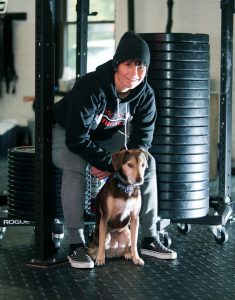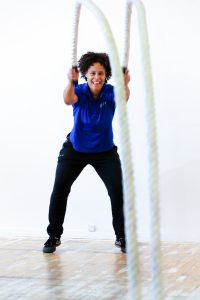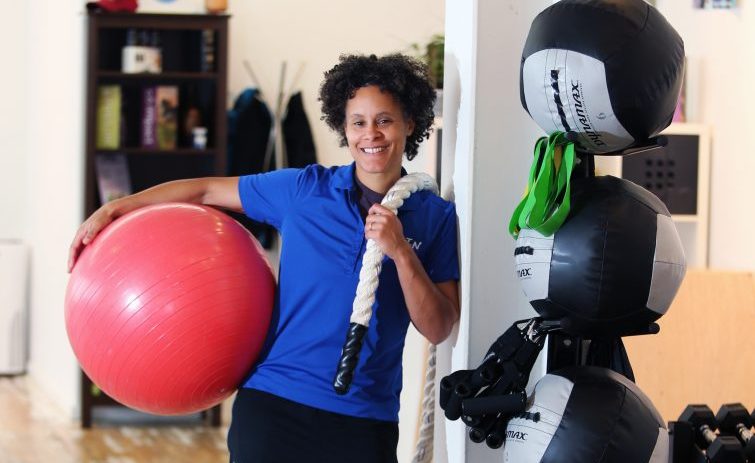Some facilities embrace inclusivity,
but LGBTQ gym-goers still face obstacles
By Jane Latus / Photography by Stan Godlewski
Who doesn’t have residual gym class locker room trauma? Especially if you were overweight or in any way different, or worse, under suspicion of being – gasp – gay. What if you couldn’t stand the sight of your own body for a most existential reason?
Locker rooms remain a source of anxiety even for cisgender, straight adults. Getting to a gym is daunting as is. Once you push past inertia and choose to exercise, it takes guts to find a place to do it. Fitness centers are intimidating.
But there’s intimidating, and then there’s dangerous.
“I’ll admit, I’m afraid to join a gym. Even with the laws on my side,” says long-distance runner and budding triathlete Karleigh Webb, a transgender woman from Bristol.
“I feel unsafe in the hyper-masculine atmosphere of most gyms,” says transgender Olympic athlete Chris Mosier.
LGBTQ exercisers, gym owners and personal trainers say that being L, G or B doesn’t raise many issues in gyms anymore, but that transgender and gender nonconforming people have to be careful.
And it isn’t only gym-goers who are cautious; queer gym owners try to avoid unpleasant surprises by making their orientation obvious.
Kristyn Mastroianni, owner of Move Strong in Manchester and a lesbian, made sure her tattoos and backward cap are prominent on her website. “It’s important that people coming into my business don’t judge me – not just for my sake, but for my clients. If they’re going to judge me, they’re going to judge anybody. My clients feel this is home to them.”

Owner at Move Strong, Manchester, CT Strength Coach, Manual and Movement Therapist
An Exercise in Equality
Finding a safe space is the main challenge, especially for trans and gender nonconforming exercisers.
This is why savvy chains market themselves as LGBTQ-inclusive, like Planet Fitness (which famously terminated a Michigan cis woman’s membership for repeatedly complaining about a trans woman using the women’s locker room – a case still in the courts) and CrossFit (where competitions are trans-inclusive).
It’s also why more trainers are filling a niche by catering to gender nonconforming customers. And why, when fitness centers make LGBTQ clients feel welcome, word spreads.
Jessica Firrin of New London, a lifelong athlete and transgender woman, says that before transitioning, she had “such bad body dysphoria in high school that I quickly showered and ran in and out as quickly as I could.”
She joined Planet Fitness in Waterford partly because of its no-judgment motto and says the staff has made her feel welcome, including finding a computer work-around to correct her name.
Still, Firrin takes pains to avoid “getting called out” in the locker room. “The challenge for me is figuring out what I’m going to wear. I’m always looking for something comfortable and feminine, and it’s difficult to hide,” she says. Compression tights help hide a bump, but hurt and make working out difficult.
She has also sacrificed swimming. “I absolutely love swimming. Since my transition, I have done no swimming at all. With bathing suits, and kids coming in and out, and community showers – I’m just not doing it. I feel like someday I’ll do it,” especially if she has bottom surgery, she says.
Trainers Who Understand
It’s important to find a trainer who won’t make assumptions based on your appearance. It’s incorrect and insensitive to assume, based on someone’s looks, that they want to lose weight, masculinize or feminize.
Even for cis, straight exercisers, assumptions don’t hold water. [An aside: as a personal trainer, I’ve had a straight, cis male client try hard to not bulk up. His job requires an expensive wardrobe, and he doesn’t want to need new suits. One cis woman built muscle intentionally, so much so that when she punched her husband (back), he needed stitches in his lip. “I didn’t know I got that strong!” she said, smiling and flexing her biceps.]
More women want to be muscular, and that’s great for Firrin, she says. “Women are feeling comfortable in being strong, and it’s definitely a good thing. I fit in now!”
Many trans clients also need a trainer who understands their medical issues: estrogen and spironolactone change fat distribution and decrease muscle mass; pre-surgery clients may need to build strength; post-surgery clients need to work on range of motion.
And then there are chest binders, the subject of a notorious New York Times story this year that focused on potential health risks, at the expense of recognizing that binders save trans men’s lives. An uninformed trainer might say to not wear one; an aware trainer can teach helpful myofascial release, as well as breathing and stretching exercises.
You can’t safely wear a binder while working out, so you may have to temporarily wear a sports bra – and clients are much comfortable doing so with a trainer who’s been there, says Alex Weaver, owner of Alien Athletes in Providence, R.I. Weaver is queer, trans and non-binary, and most of their clients are queer and trans.
Weaver says they aim to “allow people to continue to have the tools they need to live authentically and also have tools to manage their body, like mobility and stretching.”

Room for Improvement
Just as the U.N. and International Olympics Committee have called access to sports a human right, so LGBTQ advocates say this of fitness.
Besides being essential to physical health (and the only way to counteract muscle loss from aging), exercise helps manage depression and anxiety.
“We know exercise contributes to trans health and happiness,” says Scott Turner Schofield of California, a trans man and educator whose course “Everybody Changes” is used by gyms, municipalities and schools to learn how to make a space safe.
The city of Santa Monica asked Schofield to train employees after “they had a lot of rough moments, like an adult freaking out on a child in the locker room of the aquatic center.”
It’s surprisingly easy, he says, “the ease with which we put this ‘problem’ to rest.”
Schofield has people list acceptable and unacceptable locker room behaviors. They immediately recognize they already have procedures to address every bad behavior. “It’s very black and white what’s acceptable and not in a locker room. It’s about what you’re doing, it’s not about who you are,” he says.
Schofield feels an urgency to raise awareness, given that a 2017 study by The Williams Institute of UCLA found that 27 percent of youths identify as gender nonconforming.
Connecticut is one of 18 states (plus the District of Columbia) that prohibit discrimination based on “sex, gender identity or expression and sexual orientation.” But that doesn’t put Webb at ease. “Laws, rules, and regulations are one thing, but attitudes are another,” she says.
Webb transitioned two years ago at age 46. “I’ve played sports my whole life,” she says, but only now does she have to “negotiate all these things. I wear very cute clothes, partly because it’s the path of least resistance, so I can avoid embarrassing or dangerous situations.” Yet, there’s a fine line. “If I look too feminine, people come at me – ‘That’s a dude.’ ”
Being a woman of color ups the danger, she says. “The femininity of a woman who is not white is always questioned, and often denied, whether you’re trans or cis.”
Cost is also a barrier to access. For that reason, Weaver of Alien Athletes uses a sliding scale, and doesn’t sell packages that require a big upfront outlay.
In Search Of A Place For All
Webb says she’s uncovered several welcoming gyms in the state. One where she feels especially comfortable is NLTN, a holistic personal training studio in New Haven owned by Marannie Bauer.
Bauer, a lesbian, says she doesn’t go out of her way to cater to LGBTQ clients. But she’s had lesbian and trans staff members and clients, so somehow the message has come across. “I appreciate the need for everyone to have a safe space,” she says.
Webb has advice for gym owners. “There are more and more inclusive places out there. What gyms have to do is come out and say it. Businesses have to get past the idea that they’ll alienate people by saying they welcome all people. A rainbow flag in the window – it can be that simple.”
For Mastroianni, word of mouth spreads news of her inclusiveness. “If people are cool enough to come here and work out with me, who’s obviously gay, they know they’re OK with everybody.”
Asher Freeman is queer, trans and owner of Nonnormative Body Club in Philadelphia. “Almost all of my clients are people who’ve either felt unwelcome, unsafe or intimidated in conventional fitness spaces for various reasons,” they say. Gym owners should “think through how your physical space impacts your clients. At most fitness centers, everything is super gender-centered.”
They add, “Do you have to ask clients’ gender? I can’t think of any reason. Asking people’s pronouns is much more important.”
“The pronoun discussion better not last more than 10 seconds, or we’ve got a problem,” says Webb.








More Stories
A Leader in Care for LGBTQ+ Communities: Meet Kenneth Abriola, MD
Transforming Sexuality: Handling Sexual Changes for Trans Folks
MHC’s “Let’s Face It” Program Expands Mental Health Awareness